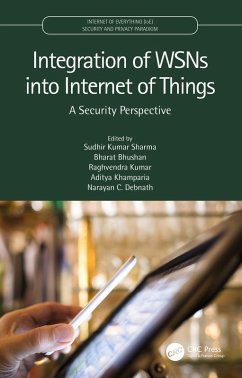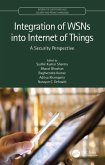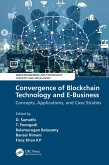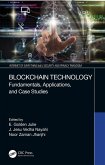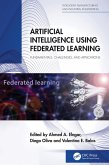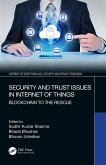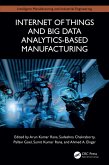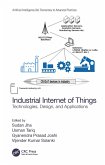Integration of WSNs into Internet of Things (eBook, PDF)
A Security Perspective
Redaktion: Sharma, Sudhir Kumar; Debnath, Narayan C.; Khamparia, Aditya; Kumar, Raghvendra; Bhushan, Bharat
51,95 €
51,95 €
inkl. MwSt.
Sofort per Download lieferbar

26 °P sammeln
51,95 €
Als Download kaufen

51,95 €
inkl. MwSt.
Sofort per Download lieferbar

26 °P sammeln
Jetzt verschenken
Alle Infos zum eBook verschenken
51,95 €
inkl. MwSt.
Sofort per Download lieferbar
Alle Infos zum eBook verschenken

26 °P sammeln
Integration of WSNs into Internet of Things (eBook, PDF)
A Security Perspective
Redaktion: Sharma, Sudhir Kumar; Debnath, Narayan C.; Khamparia, Aditya; Kumar, Raghvendra; Bhushan, Bharat
- Format: PDF
- Merkliste
- Auf die Merkliste
- Bewerten Bewerten
- Teilen
- Produkt teilen
- Produkterinnerung
- Produkterinnerung

Bitte loggen Sie sich zunächst in Ihr Kundenkonto ein oder registrieren Sie sich bei
bücher.de, um das eBook-Abo tolino select nutzen zu können.
Hier können Sie sich einloggen
Hier können Sie sich einloggen
Sie sind bereits eingeloggt. Klicken Sie auf 2. tolino select Abo, um fortzufahren.

Bitte loggen Sie sich zunächst in Ihr Kundenkonto ein oder registrieren Sie sich bei bücher.de, um das eBook-Abo tolino select nutzen zu können.
The internet has gone from an internet of people, to an Internet of Things. This has brought forth strong levels of complexity in handling interoperability that involves the integrating of WSNs into IoT.
- Geräte: PC
- ohne Kopierschutz
- eBook Hilfe
- Größe: 8.87MB
Andere Kunden interessierten sich auch für
![Integration of WSNs into Internet of Things (eBook, ePUB) Integration of WSNs into Internet of Things (eBook, ePUB)]() Integration of WSNs into Internet of Things (eBook, ePUB)51,95 €
Integration of WSNs into Internet of Things (eBook, ePUB)51,95 €![Convergence of Blockchain Technology and E-Business (eBook, PDF) Convergence of Blockchain Technology and E-Business (eBook, PDF)]() Convergence of Blockchain Technology and E-Business (eBook, PDF)55,95 €
Convergence of Blockchain Technology and E-Business (eBook, PDF)55,95 €![Blockchain Technology (eBook, PDF) Blockchain Technology (eBook, PDF)]() Blockchain Technology (eBook, PDF)48,95 €
Blockchain Technology (eBook, PDF)48,95 €![Artificial Intelligence Using Federated Learning (eBook, PDF) Artificial Intelligence Using Federated Learning (eBook, PDF)]() Artificial Intelligence Using Federated Learning (eBook, PDF)52,95 €
Artificial Intelligence Using Federated Learning (eBook, PDF)52,95 €![Security and Trust Issues in Internet of Things (eBook, PDF) Security and Trust Issues in Internet of Things (eBook, PDF)]() Security and Trust Issues in Internet of Things (eBook, PDF)60,95 €
Security and Trust Issues in Internet of Things (eBook, PDF)60,95 €![Internet of Things and Big Data Analytics-Based Manufacturing (eBook, PDF) Internet of Things and Big Data Analytics-Based Manufacturing (eBook, PDF)]() Internet of Things and Big Data Analytics-Based Manufacturing (eBook, PDF)52,95 €
Internet of Things and Big Data Analytics-Based Manufacturing (eBook, PDF)52,95 €![Industrial Internet of Things (eBook, PDF) Industrial Internet of Things (eBook, PDF)]() Industrial Internet of Things (eBook, PDF)50,95 €
Industrial Internet of Things (eBook, PDF)50,95 €-
-
-
The internet has gone from an internet of people, to an Internet of Things. This has brought forth strong levels of complexity in handling interoperability that involves the integrating of WSNs into IoT.
Dieser Download kann aus rechtlichen Gründen nur mit Rechnungsadresse in A, B, BG, CY, CZ, D, DK, EW, E, FIN, F, GR, HR, H, IRL, I, LT, L, LR, M, NL, PL, P, R, S, SLO, SK ausgeliefert werden.
Produktdetails
- Produktdetails
- Verlag: Taylor & Francis eBooks
- Seitenzahl: 368
- Erscheinungstermin: 3. Juni 2021
- Englisch
- ISBN-13: 9781000370041
- Artikelnr.: 61519978
- Verlag: Taylor & Francis eBooks
- Seitenzahl: 368
- Erscheinungstermin: 3. Juni 2021
- Englisch
- ISBN-13: 9781000370041
- Artikelnr.: 61519978
- Herstellerkennzeichnung Die Herstellerinformationen sind derzeit nicht verfügbar.
Dr. Sudhir Kumar Sharma is currently a Professor and Head of the Department of Computer Science, Institute of Information Technology & Management affiliated to GGSIPU, New Delhi, India. He has extensive experience for over 21 years in the field of Computer Science and Engineering. He obtained his Ph.D. degree in Information Technology from USICT, GGSIPU, New Delhi, India. Dr. Sharma obtained his M. Tech degree in Computer Science & Engineering in 1999 from the Guru Jambheshwar University, Hisar, India and M.Sc. degree in Physics from the University of Roorkee (now IIT Roorkee), Roorkee, in 1997. His research interests include Machine Learning, Data Mining, and Security. He has published more than 50 research papers in various prestigious International Journals and International Conferences. He is a life member of CSI and IETE. Dr. Sharma is lead guest editor of special issue in Multimedia Tools & Applications, Springer. He was a convener and volume Editor of ICETIT-2019 and ICRIHE-2020. He authored and edited 5 computer science books in the field of Internet of Things, WSN, Block Chain and Cyber Physical Systems of Springer, Elsevier, CRC Press, USA. He was selected as a reviewer /editorial board member for several reputed international journals. He has also served as a speaker, session chair or co-chair at various National and International Conferences. Mr. Bharat Bhushan is an Assistant Professor of Department of Computer Science and Engineering (CSE) at School of Engineering and Technology, Sharda University, Greater Noida, India. He is an alumnus as well as a Ph.D. scholar of Birla Institute of Technology, Mesra. He received his Undergraduate Degree (B-Tech in Computer Science and Engineering) with Distinction in 2012 and received his Postgraduate Degree (M-Tech in Information Security) with Distinction in 2015 from Birla Institute of Technology, Mesra, India. He earned numerous international certifications such as Cisco Certified Network Associate (CCNA), Cisco Certified Entry Networking Technician (CCENT), Microsoft Certified Technology Specialist (MCTS), Microsoft Certified IT Professional (MCITP) and Cisco Certified Network Professional Trained (CCNP). In the last three years, he has Published more than 80 research papers in various renowned International conferences and SCI indexed journals including Wireless Networks (Springer), Wireless Personal Communications (Springer), Sustainable Cities and Society (Elsevier) and Emerging Transactions on Telecommunications (Wiley). He has contributed with more than 20 book chapters in various books and is currently in the process of editing 7 books from the most famed publishers like Elsevier, IGI Global, and CRC Press. He has served as a Reviewer/Editorial Board Member for several reputed international journals including IEEE Access, IEEE Communication Surveys and Tutorials and Wireless Personal Communication (Springer). He has also served as Speaker and Session Chair at more than 15 National and International Conferences. His current research interests include Wireless Sensor Networks (WSNs), Internet of Things (IoT) and Blockchain technology. In the past, he worked as an assistant professor at HMR Institute of Technology and Management, New Delhi and Network Engineer in HCL Infosystems Ltd., Noida. He has qualified GATE exams for successive years and gained the highest percentile of 98.48 in GATE 2013. He is also a member of numerous renowned bodies including IEEE, IAENG, CSTA, SCIEI, IAE and UACEE. Dr. Raghvendra Kumar is working as Associate Professor in Computer Science and Engineering Department at GIET University, India. He received B. Tech, M.Tech and Ph.D. in Computer Science and Engineering, India, and Postdoc Fellow from Institute of Information Technology, Virtual Reality and Multimedia, Vietnam. He serves as Series Editor Internet of Everything (IOE): Security and Privacy Paradigm, Green Engineering and Technology: Concepts and Applications, publishes by CRC press, Taylor & Francis Group, USA, and Bio-Medical Engineering: Techniques and Applications, Publishes by Apple Academic Press, CRC Press, Taylor & Francis Group, USA. He also serves as acquisition editor for Computer Science by Apple Academic Press, CRC Press, Taylor & Francis Group, USA. He has published number of research papers in international journal (SCI/SCIE/ESCI/Scopus) and conferences including IEEE and Springer as well as serve as organizing chair (RICE-2019, 2020), volume Editor (RICE-2018), Keynote speaker, session chair, Co-chair, publicity chair, publication chair, advisory board, Technical program Committee members in many international and national conferences and serve as guest editors in many special issues from reputed journals (Indexed By: Scopus, ESCI, SCI). He also published 13 chapters in edited book published by IGI Global, Springer and Elsevier. His researches areas are Computer Networks, Data Mining, cloud computing and Secure Multiparty Computations, Theory of Computer Science and Design of Algorithms. He authored and Edited 23 computer science books in field of Internet of Things, Data Mining, Biomedical Engineering, Big Data, Robotics, and IGI Global Publication, USA, IOS Press Netherland, Springer, Elsevier, CRC Press, USA. Dr. Aditya Khamparia is an eminent academician; plays versatile roles and responsibilities juggling between lectures, research, publications, consultancy, community service and PhD supervision etc. With Seven years of rich expertise in teaching and two years in industry; he focuses on rational and practical learning. Currently, He is working as Associate Professor of Computer Science and Engineering at Lovely Professional University, Punjab, India. His research area is Machine Learning, Soft Computing, Educational Technologies, IoT, Semantic Web and Ontologies. He has published more than 50 scientific research publications in reputed International/National Journals and Conferences, which are indexed in various international databases. Invited as a Faculty Resource Person/Session Chair/Reviewer/TPC member in different FDP, conferences and journals. Dr. Aditya received research excellence award in 2016, 2017 and 2018 at Lovely Professional University for his research contribution during the academic year. He is member of CSI, IET, ISTE, IAENG, ACM and IACSIT. He is also acting as reviewer and member of various renowned national and international conferences/journals. Invited as a Faculty Resource Person/Session Chair/Reviewer/TPC member in different FDP, conferences and journals. Professor (Dr.) Narayan C. Debnath is currently the Founding Dean of the School of Computing and Information Technology at Eastern International University, Vietnam. He is also serving as the Head of the Department of Software Engineering at Eastern International University, Vietnam. Dr. Debnath has been the Director of the International Society for Computers and their Applications (ISCA) since 2014. Formerly, Dr. Debnath served as a Full Professor of Computer Science at Winona State University, Minnesota, USA for 28 years (1989-2017). He was elected as the Chairperson of the Computer Science Department at Winona State University for 3 consecutive terms and assumed the role of the Chairperson of the Computer Science Department at Winona State University for 7 years (2010-2017). Dr. Debnath earned a Doctor of Science (D.Sc.) degree in Computer Science and also a Doctor of Philosophy (Ph.D.) degree in Physics. In the past, he served as the elected President for 2 separate terms, Vice President, and Conference Coordinator of the International Society for Computers and their Applications, and has been a member of the ISCA Board of Directors since 2001. Before being elected as the Chairperson of the Department of Computer Science in 2010 at Winona State University, he served as the Acting Chairman of the Department. During 1986-1989, Dr. Debnath served as an Assistant Professor of the Department of Mathematics and Computer Systems at the University of Wisconsin-River Falls, USA, where he was nominated for the National Science Foundation (NSF) Presidential Young Investigator Award in 1989. Dr. Debnath is an author or co-author of over 425 publications in numerous refereed journals and conference proceedings in Computer Science, Information Science, Information Technology, System Sciences, Mathematics, and Electrical Engineering. Dr. Debnath has been a visiting professor at universities in Argentina, China, India, Sudan, and Taiwan. Dr. Debnath has been an active member of the ACM, IEEE Computer Society, Arab Computer Society, and a senior member of the ISCA.
Chapter 1 Security Issues, Vulnerabilities and Defense Mechanisms in
Wireless Sensor Network: State of the Art and Recommendation
Chapter 2. Security Attacks and Countermeasures in Wireless Sensor Network
Chapter 3. Overview of Ubiquitous Computing and a Modern Look in Current
Times
Chapter 4. Cryptanalysis and Security Evaluation Using Artificial Neural
Networks)
Chapter 5. Post-Quantum Cryptography on Wireless Sensor Networks:
Challenges and Opportunities
Chapter 6 Performance Evaluation Using Different Routing Protocols in
MANETs
Chapter 7.Smart Agriculture Using Wireless Sensor Networks
Chapter 8. Big Data Analytics for WSNs and Smart Grids: Applications,
Design Issues and Future Challenges
Chapter 9. A New Algorithm Proposed for the Disaggregation of Loads in the
Smart Grid Context
Chapter 10. A Security Paradigm of WSN, IoT and CPS: Challenges and
Solutions
Chapter 11. (IoT: Fundamentals and Challenges)
Chapter 12. Enabling Technologies, Attacks and Machine Learning based
Countermeasures for IoT and IIoT
Chapter 13. Applications of AI and ML in IoT
Chapter 14. Ubiquities Computing for Management, Evaluation, Treatment and
Rehabilitation of Psychological Disorders
Chapter 15. Challenges and Vulnerabilities of WSNs based IoT in Healthcare
and Medical industry
Chapter 16. (Blockchain Technology for Healthcare Cloud-Based Data Privacy
and Security)
Wireless Sensor Network: State of the Art and Recommendation
Chapter 2. Security Attacks and Countermeasures in Wireless Sensor Network
Chapter 3. Overview of Ubiquitous Computing and a Modern Look in Current
Times
Chapter 4. Cryptanalysis and Security Evaluation Using Artificial Neural
Networks)
Chapter 5. Post-Quantum Cryptography on Wireless Sensor Networks:
Challenges and Opportunities
Chapter 6 Performance Evaluation Using Different Routing Protocols in
MANETs
Chapter 7.Smart Agriculture Using Wireless Sensor Networks
Chapter 8. Big Data Analytics for WSNs and Smart Grids: Applications,
Design Issues and Future Challenges
Chapter 9. A New Algorithm Proposed for the Disaggregation of Loads in the
Smart Grid Context
Chapter 10. A Security Paradigm of WSN, IoT and CPS: Challenges and
Solutions
Chapter 11. (IoT: Fundamentals and Challenges)
Chapter 12. Enabling Technologies, Attacks and Machine Learning based
Countermeasures for IoT and IIoT
Chapter 13. Applications of AI and ML in IoT
Chapter 14. Ubiquities Computing for Management, Evaluation, Treatment and
Rehabilitation of Psychological Disorders
Chapter 15. Challenges and Vulnerabilities of WSNs based IoT in Healthcare
and Medical industry
Chapter 16. (Blockchain Technology for Healthcare Cloud-Based Data Privacy
and Security)
Chapter 1 Security Issues, Vulnerabilities and Defense Mechanisms in
Wireless Sensor Network: State of the Art and Recommendation
Chapter 2. Security Attacks and Countermeasures in Wireless Sensor Network
Chapter 3. Overview of Ubiquitous Computing and a Modern Look in Current
Times
Chapter 4. Cryptanalysis and Security Evaluation Using Artificial Neural
Networks)
Chapter 5. Post-Quantum Cryptography on Wireless Sensor Networks:
Challenges and Opportunities
Chapter 6 Performance Evaluation Using Different Routing Protocols in
MANETs
Chapter 7.Smart Agriculture Using Wireless Sensor Networks
Chapter 8. Big Data Analytics for WSNs and Smart Grids: Applications,
Design Issues and Future Challenges
Chapter 9. A New Algorithm Proposed for the Disaggregation of Loads in the
Smart Grid Context
Chapter 10. A Security Paradigm of WSN, IoT and CPS: Challenges and
Solutions
Chapter 11. (IoT: Fundamentals and Challenges)
Chapter 12. Enabling Technologies, Attacks and Machine Learning based
Countermeasures for IoT and IIoT
Chapter 13. Applications of AI and ML in IoT
Chapter 14. Ubiquities Computing for Management, Evaluation, Treatment and
Rehabilitation of Psychological Disorders
Chapter 15. Challenges and Vulnerabilities of WSNs based IoT in Healthcare
and Medical industry
Chapter 16. (Blockchain Technology for Healthcare Cloud-Based Data Privacy
and Security)
Wireless Sensor Network: State of the Art and Recommendation
Chapter 2. Security Attacks and Countermeasures in Wireless Sensor Network
Chapter 3. Overview of Ubiquitous Computing and a Modern Look in Current
Times
Chapter 4. Cryptanalysis and Security Evaluation Using Artificial Neural
Networks)
Chapter 5. Post-Quantum Cryptography on Wireless Sensor Networks:
Challenges and Opportunities
Chapter 6 Performance Evaluation Using Different Routing Protocols in
MANETs
Chapter 7.Smart Agriculture Using Wireless Sensor Networks
Chapter 8. Big Data Analytics for WSNs and Smart Grids: Applications,
Design Issues and Future Challenges
Chapter 9. A New Algorithm Proposed for the Disaggregation of Loads in the
Smart Grid Context
Chapter 10. A Security Paradigm of WSN, IoT and CPS: Challenges and
Solutions
Chapter 11. (IoT: Fundamentals and Challenges)
Chapter 12. Enabling Technologies, Attacks and Machine Learning based
Countermeasures for IoT and IIoT
Chapter 13. Applications of AI and ML in IoT
Chapter 14. Ubiquities Computing for Management, Evaluation, Treatment and
Rehabilitation of Psychological Disorders
Chapter 15. Challenges and Vulnerabilities of WSNs based IoT in Healthcare
and Medical industry
Chapter 16. (Blockchain Technology for Healthcare Cloud-Based Data Privacy
and Security)
